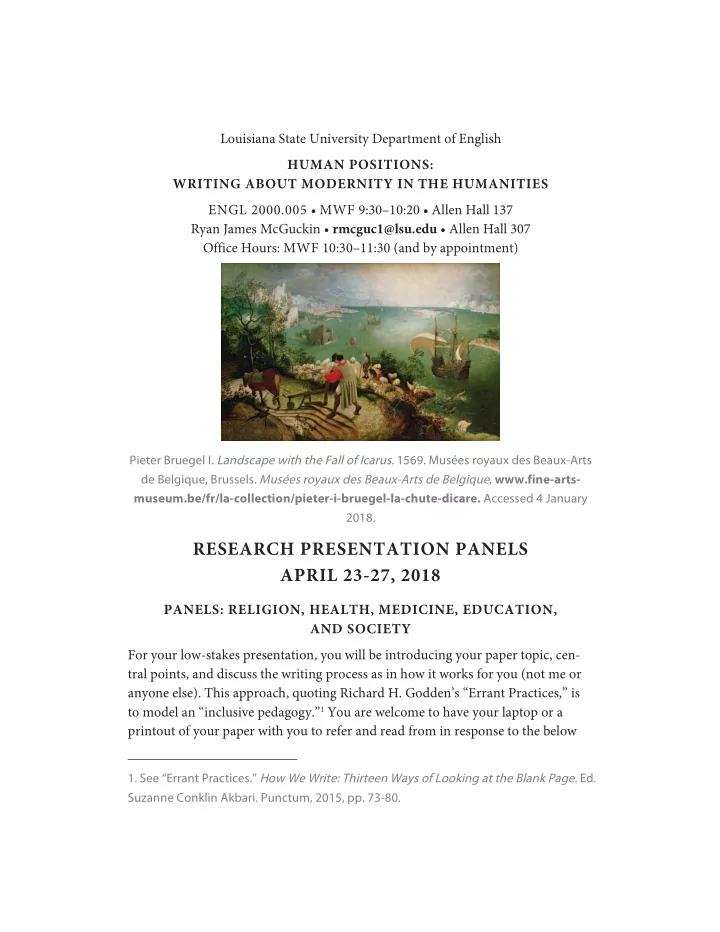

Louisiana State University Department of English HUMAN POSITIONS: WRITING ABOUT MODERNITY IN THE HUMANITIES ENGL 2000.005 • MWF 9:30–10:20 • Allen Hall 137 Ryan James McGuckin • rmcguc1@lsu.edu • Allen Hall 307 Office Hours: MWF 10:30–11:30 (and by appointment) Pieter Bruegel I. Landscape with the Fall of Icarus. 1569. Musées royaux des Beaux-Arts de Belgique, Brussels . Musées royaux des Beaux-Arts de Belgique , www.fine-arts- museum.be/fr/la-collection/pieter-i-bruegel-la-chute-dicare. Accessed 4 January 2018. RESEARCH PRESENTATION PANELS APRIL 23-27, 2018 PANELS: RELIGION, HEALTH, MEDICINE, EDUCATION, AND SOCIETY For your low-stakes presentation, you will be introducing your paper topic, cen- tral points, and discuss the writing process as in how it works for you (not me or anyone else). This approach, quoting Richard H. Godden’s “Errant Practices,” is to model an “inclusive pedagogy.” 1 You are welcome to have your laptop or a printout of your paper with you to refer and read from in response to the below 1. See “Errant Practices.” How We Write: Thirteen Ways of Looking at the Blank Page. Ed. Suzanne Conklin Akbari. Punctum, 2015, pp. 73-80.
R . MCCUCKIN – HUMAN POSITIONS – SPRING 2018 prompts. Just as with academic conferences, after everyone in your panel has gone, the class will be able to give responses and ask questions. We will have one group per-day to present. See the groups in the following pages. Guidelines. For your presentation, you should aim to briefly address the follow- ing: 1. Tell us about your thesis argument 2. Beside your primary text, tell us one secondary source that you used AND tell us what is your other class text source. Of the two mentioned sources, share a passage from one that you found helpful 3. From the hat, pick and respond to a reflection question about your writing process (questions are listed after the below schedule) 2
R . MCCUCKIN – HUMAN POSITIONS – SPRING 2018 RELIGION AND HEALTH (Robert Doisneau. Rêverie suave et rose . 1949.) ESSAYS 1. On Ciardi: Food, Exercise, and You or A Codependent Relationship 2. On Camus’ The Plauge: Looks can be Deceiving 3. On Selzer’s “The Surgeon as a Priest”: Something Other Than Tradi- tional Medicine 4. On Selzer’s “The Surgeon as a Priest”: Spirituality in Medicine 3
R . MCCUCKIN – HUMAN POSITIONS – SPRING 2018 THE ETHICS OF MEDICINE AND DEATH (Banksy. Untitled. 2010. Chinatown, San Francisco, CA) ESSAYS 1. On Selzer’s “The Surgeon as a Priest”: The Balance of Faith and Medicine 2. On Camus: Faith vs. Medicine or Should Faith be a Source of Medication? 3. The Feelings of the Inevitable: Lucretius and Death 4. The Epic of Gilgamesh: The Universal Resistance of Death 5. “The Surgeon As Priest”: Selzer’s Sanctioned Intrusion 4
R . MCCUCKIN – HUMAN POSITIONS – SPRING 2018 EDUCATION AND SOCIETY (Michelangelo Merisi da Caravaggio. The Cardsharps. 1594. Kimbell Art Museum, Fort Worth, TX.) ESSAYS 1. Song to Fulfill: Whitman’s Social Media 2. Kinnell’s “The Fly”: Social Psychology 3. Plato’s The Symposium and the Science of Love 4. On Whitman: Experiential Education 5
R . MCCUCKIN – HUMAN POSITIONS – SPRING 2018 TWENTY QUESTIONS ON WRITING: PROCESS AND RECEPTION 2 1. What did you have to leave out? 2. What did you prioritize putting in? 3. Who was the audience you had in mind? 4. Would someone from various disciplines care about your project? Why? 5. Explain one stylistic thing you do too much or too often in your writing. 6. Explain one stylistic thing you do too little or too infrequently. 7. Name a writer or critic whose writing you would like yours to resemble. Why? 8. If your essay was a barnyard animal, which would it be? 9. If your essay was a celestial body, what would it be? 10. If your essay were a pop song, what would it be? 11. How long did it take you to write your introduction? What was easy? And difficult? 12. How long did it take you to write your conclusion? What was easy? And difficult? 13. How long did it take you to write one of your body paragraphs (pick one)? What was easy? And difficult? 14. Is your project making a difference in what we know about something, or in how we know about something? 15. In your project, are you asking new questions about old stuff, or old ques- tions about new stuff? 16. How timely is your project? That is, is it in conversation with any current trends? 17. What kind of data and evidence are you working with? 2. With thanks to Chris Barrett, LSU Associate Professor of English, for providing this list. 6
R . MCCUCKIN – HUMAN POSITIONS – SPRING 2018 18. Are you making an argument about things in relation to another time or to ours? 19. If asked, I could articulate the core argument of this project in one sen- tence? What would it be? 20. If asked, I could articulate the core conclusion/next steps of this project in one sentence? What would it be? 7
Recommend
More recommend